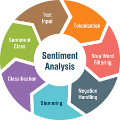Aspect-Based Sentiment Analysis (ABSA) studies the consumer opinion on the market products. It involves examining the type of sentiments as well as sentiment targets expressed in product reviews. Analyzing the language used in a review is a difficult task that requires a deep understanding of the language. In recent years, deep language models, such as BERT \cite{devlin2019bert}, have shown great progress in this regard. In this work, we propose two simple modules called Parallel Aggregation and Hierarchical Aggregation to be utilized on top of BERT for two main ABSA tasks namely Aspect Extraction (AE) and Aspect Sentiment Classification (ASC) in order to improve the model's performance. We show that applying the proposed models eliminates the need for further training of the BERT model. The source code is available on the Web for further research and reproduction of the results.
翻译:以外观为基础的感官分析(ABSA)研究消费者对市场产品的看法,它涉及审查产品审查中表达的情绪和情绪目标的类型。分析审查中使用的语言是一项艰巨的任务,需要深入了解该语言。近年来,深语言模型,如BERT\cite{devlin2019bert},在这方面取得了巨大进展。在这项工作中,我们提议在BERT上方使用两个简单的模块,称为平行聚合和分级聚合,用于BERT的两项主要任务,即Aspect Expliton(AE)和Aspect Tentiment(ASC),以提高该模型的性能。我们表明,应用拟议的模型消除了对BERT模型进一步培训的需要。源代码可在网上查阅,以便进一步研究和复制结果。










